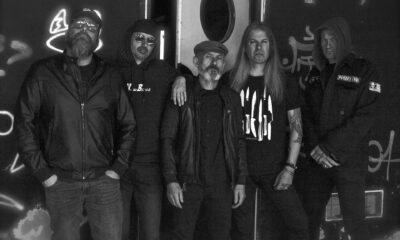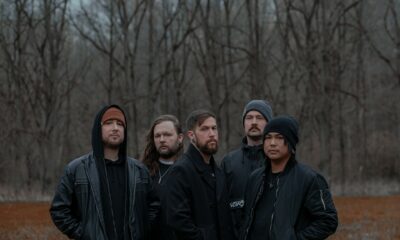Interviews
Antiquated Notions and Hesher Dude Potions: An Interview with WARDEHNS
Wardehns is a crust punk-infused, sludgy, thrashing, D-beat abusing metal group from the tiny town of Wausau, Wisconsin who recently released their debut album, Now Cometh the Foul. We spoke with the band about the album and their origins.

I realize that for many of you, much of the following is going to sound like the ridiculous ramblings of old men. I also realize that any former journalism professors and/or writing instructors reading this are likely cringing at my starting this piece in the first person, but it had to be done; there’s a personal angle to this.
Wardehns is a crust punk-infused, sludgy, thrashing, D-beat abusing metal group from the tiny town of Wausau, Wisconsin. Their self-released debut album, Now Cometh the Foul is now available digitally with the physical release set for March 15th and vinyl to be issued as soon as possible afterwards. And while many might only see this as another run-of-the-mill interview with another band, albeit an awesome one (because why would anyone trump a band they thought sucked?), there is a somewhat interesting and charming old-school story about how Wardehns came onto my radar and how we got from then to now.
Back in the late spring/early summer of 2017, I was travelling with New York City’s post-black metal maestros, Tombs. We were on our way to Atlanta for the first date of a five-week trek that saw the band share the stage, at various points, with 1349, Goatwhore, Kreator, Crowbar and Incite, not to mention various headlining gigs and a early afternoon spot on the side stage at that year’s Ozzfest Meets Knotfest in San Bernadino, California. Somewhere along the stretch of I-85 that connects Charlotte, North Carolina and Atlanta, a stop was made at a rest/truck stop in order to refuel the van and ourselves. At the far end of the lot, where RVs, tour buses, vehicles towing trailers and the like are required to post up, we spotted another van with a trailer. Spend any amount of time touring and you can tell which vans with trailers are bands and which aren’t and this particular vehicle was instantly recognized as another bunch of fellow road dogs. Consciously or not, we pulled and parked alongside them before doing our rest stop thing.
As everyone in both parties returned from whatever business they had in the building’s facilities, I noticed a fellow hanging around the other van sporting a shirt from London-based “violin and cello-driven emo crust” band, Morrow. Inevitably, a conversation was struck up. We discovered the other band was called We Are the Heathens, that they hailed from Wisconsin, were also on their way to Atlanta and were also playing in town that night. One of the dudes from We Are the Heathens, self-described as crusty folk punk, decided to put his heavier colors on display and handed out a couple of CDs packaged in slipcases of his other band’s two-song demo/EP.
Feel the power of Wardehns with this stream of their overpowering track “Shards of The Time Glass.”
Myself, having penned the unsigned band column for Decibel Magazine for the past few years, being handed demos and checking out unsigned bands is nothing new, but two things grabbed me about the Wardehns demo. First, its description as being crustier and more metal which, admittedly, is a style I can’t get enough of, and the cross street where I grew up (and where my parents still live) is called Warden Avenue. Call me a sentimental fool, but I developed a minor affinity for the band on the spot, even if they botched the spelling.
Copies of the CD in hand, we bid “farewells,” “good lucks” and “stay safes” and headed out. Later that day or the next, I threw on the self-titled EP and loved it! My arrival home some weeks later coincided with the deadline for another column for Decibel and I fast-tracked the Wardehns disc for inclusion. That was the last I’d heard of, from or about the band until ripples earlier this year about their forthcoming debut full-length. Eventually, I tracked down a promo copy after which I did a bit of research and discovered Wardehns had been regularly hoofing it out on the DIY circuit and were going the independent route for the recording and release of the album. After being unexpectedly blown away after hearing Now Cometh the Foul, I successfully pitched the piece you’re reading now, got in touch with the gentleman working the record for them (Curtis Dewar), explained how this all came to be, set up an interview and here we are.
“So, I met you when I was with We Are the Heathens?!” exclaimed guitarist/vocalist Adam Geurink. “I probably had shitty facial hair and I remember handing you a Wardehns EP. When Curtis sent the message explaining all of this, I was like, “Holy shit! I remember that!’ I can’t believe that you’re the same guy.”
As much as the below is an introductory interview with a new band I’ve quickly grown to become a fan of, it’s also a discourse on the power of personal connection, to the importance of physical copies of releases, to DIY ethics, to the effectiveness of old-school scene building and word of mouth. Much of the following flies in the face of what we have forced down our throats about music in the modern age; how it exists, is promoted, is consumed and experienced in the online world (and yes, I totally see in the irony in having this run on an online portal).
It’s also a salute to the inexperience and innocence of a band who haven’t yet had their enthusiastic souls and love for what they do crushed by the industry, expectation, criticism and low returns for hard work. Chatting with a band new to the ways of the promotional interview (“First thing I have to say,” remarks Adam, “is that I’ve never done an interview for this band, or done an interview over the phone before”) is always interesting, but in Wardehns’ case, it was doubly neat to hear the closeness and friendship of the band’s members (Geurink is joined by drummer Thomas Sorbet and bassist Brad Beilke). Their inclination to finish each other’s sentences cut through the nervousness of what to say and how to say it. If anything, it’s curious fun to backtrack the Johnny Appleseed-ing of this story and how face-to-face meetings and in-person flesh pressing have resulted in you now reading about a previously unknown (but hopefully for not much longer) band from a town with a population of just over 2000.
So, from a nondescript rest stop in the American south, to placing a piece of electronically coded piece of plastic into an actual functioning CD player, through to the printed pages of Decibel and tiny venues throughout the Midwest to whatever device you’re scoping PureGrainAudio out on, here cometh Wardehns.
Wardehns filmed a DIY video for this performance of “Bloodlines.”
What can you tell us about your band’s history? Coming from a small town, is it a case of you being the “only three dudes in town” type of scenario?
Adam Geurink: We’re definitely three of the only dudes in town who are into this music, but it took a long time to get together.
Thomas Sorbet: We were all in a couple of different bands over the years and kind of knew each other from the music scene in general, which was never very big. One day, Adam had this idea in mind and we started jamming and it turned out it worked pretty well for us.
Geurink: We should have tried this years ago. (laughs)
Sorbet: Yeah, yeah. We’ve been living in this town our whole lives and it took us until our late 20s to finally get a project going.
What can you tell us about the town you are from?
Sorbet: We’re from Wausau, Wisconsin. That is north-central Wisconsin and a few hours drive away from anywhere where we play shows. The closest major city would probably be Madison.
How many false starts had you had playing in bands before you felt comfortable doing Wardehns?
Geurink: For me, it was instant. After we started off and wrote a few songs, it was like, “Yeah, this is what we want to do.” This is the first metal band I’ve been in in my entire life. Being from Wausau, there was never anyone around to start a metal band with, so I played in punk bands. We all played different genres of stuff, but being from Wausau, you can never start the band you want. I met Brad randomly in Indiana. Our other bands were on tour and we crossed paths randomly on tour and talked about starting a heavy band when we got home and it was like “Finally!” As soon as we got home from those tours, we started jamming and within two or three months we had a set and started playing shows.
The album Now Cometh The Foul was released on December 21st, 2018

If you’re all in other bands that tour and whatnot, there must be some kind of scene and local interest?
Geurink: There has been a strong scene here, at times. It comes and goes and it’s usually someone with a basement or a couple of friends who want to have a little venue in their house for a while. It’ll be a good time until people move away. The city isn’t big enough for people to stick around and continue on so it fades in and out. I remember when I was younger, I thought the music scene here was really awesome and thought “Wow, this really cool.” Once I grew up and started playing in bands that opinion changed quite a bit.
In that case, is it difficult to be a band in Wausau and that in order to play you have to get out and tour?
Geurink: I’ve only ever been in bands that tour and don’t play in our hometown, actually. We do play here, but outside of the basement venues that come and go, there’s one place to play. You have to tour because there’s nowhere else and you have to leave to play.
Brad Beilke: There’s one bar in town that does original music and all the other bars only do cover bands.
Sorbet: And there aren’t enough bands around to be setting up shows, so you just book a DIY tour and see how it goes.
Is there a local fanbase to support bands, whether they’re from town or otherwise?
Geurink: On a good night we’ll play to fifty people at the local bar, but twenty of those people are people we know very well. It’s not like random people showing up going, “Hey, we heard your music, we like you and decided to check it out.” When we leave town, people know our stuff.
Sorbet: It’s nice to start racking up a little following in other cities which is starting to happen. We go down to Kenosha which is three, four hours away and people actually know who we are and sing along to the songs, it’s pretty cool. But it hasn’t really happened much in Wausau except for the people who are there by default.
Once you get out of town and tour, do you find that people at home start to care? Almost like you’re a local celebrity or an ambassador for the town?
Geurink: Yes and no. I actually think it might make people like us less. (laughs)
Beilke: It makes us want to play out of town shows more and play in Wausau less. People here are maybe sometimes bummed that they’re missing out.
Geurink: But at the same time, if you want to play in Wausau, you want to play once every few months because everybody’s already bored of the same shit already.
Sorbet: You can’t play the same bar even once a month, people won’t come out because they just saw us.
What are some of the differences you’ve noticed in your hometown scene and in the bigger cities you’ve played?
Geurink: The scene is so small here that everybody is into everything and everybody supports everybody’s bands. We all almost all literally know each other. At a show in a big city, there will a bunch of different groups of friends who all might not like each other. In Wausau, it’s more like one big giant group.
Sorbet: Well, maybe not giant… (laughs)
Geurink: Ok, it’s not that big, but we all play shows together. Even if none of our genres match up, we all know each other and play shows with each other. On the other hand, Kenosha is one of the most supportive places I’ve played in any band. It seems like the scene in Kenosha is where everybody is there and stoked all the time. They come out and they go really hard. That’s one place I love to play.
Sorbet: Of course, each city is kind of different and it depends on what band you’re playing with. Like in a bigger city, each band had its own crowd and sometimes they overlap but it depends where you’re playing and who you’re playing with to determine which people will come out.
What’s up with the spelling of the band’s name?
Geurink: Thomas likes the word ‘wardens’ and we wanted it to look cooler so we put in the ‘H’ and figured that it would be more metal. It’s not a very exciting story. I guess Wardehns has its own story. I had this idea of this big, long post-apocalyptic story about these dudes that are the wardens of whatever and they have these fetuses that are harvested out of this scientist so there’s that but all that came after the name.
How soon after you formed did you record the EP?
Geurink: Um, when did we record that? In July?
Beilke: We started it in February.
Geurink: Maybe we released it in July.
Beilke: Either way, it was about six months or so after we started.
Aside from handing copies to random strangers at rest stops, how else did you get it out there?
Sorbet: We mostly just threw it up on Bandcamp. Other than those burned CDs, we didn’t have any real official physical copies of it, and we didn’t have a show release party for it. Those, we either gave away or sold for super cheap at shows and tried to spread it around as best as we could.
That’s surprising to hear because I know a couple of bigger name metal websites picked it up for streaming and such. What were the reactions like?
Geurink: We had a couple of decent reviews.
Sorbet: I remember one guy said it was boring but other than that people were stoked and we got a pretty good reaction to those two songs.
Geurink: As far as us getting it out there, that’s mostly been people finding it. We weren’t that proactive. At that point, I didn’t even know you were supposed to send your stuff into people to get reviewed! We just put it out and were hoping for the best.
Sorbet: At the time, we were, let’s just go record two tracks and release them to let people know we’re a band and so that they can hear something by us before they book us because we need to play shows to make some money to pay for a recording. We just threw them out there.
Beilke: We had about half of the album written or at least a fair amount done at the time, so we just picked the two songs that were the most complete or ready and did those first and kind of planned on our next recording dates and knew we were going to include those on the album, but we just wanted to get something out there so that people could hear what our sound was like a little bit.
Were you successful in being able to book more shows?
Geurink: Well, yeah. People started hitting us up almost right away after we released it, but we had people be like, “Come play in Texas. Come in play in Washington.” We need to figure out how to connect the dots if we’re going to do that. But now that we’ve released the entire album, we’re getting a lot more show offers, so all that should be getting easier.
“Crustacean” is the lead track off of Now Cometh The Foul.
Did you find people were more receptive because you had something physical they could get their hands on?
Geurink: We had only played a couple shows before we released that and right after that is when we first started gigging. There would be a handful of people who found us on the internet and would come to see us, but we’re still pretty new to everybody. Lately, now, the shows are starting to be where you’ll have people who have seen us before. Wausau is a hard town to get out of, but we’re planning on touring this summer or spring, doing the whole west coast or something like that.
What’s the story behind the title of the album and how does the cover art relate?
Geurink: I guess the title is kind of about waiting to play this kind of music for a while. We’ve been waiting a long time to do this and now we’ve finally done it, so I guess Now Cometh the Foul is about the coming of some nasty shit (laughs). We drove home through this ridiculous blizzard right as we were finishing all of the recording from Madison through an 18-inch snowstorm. It was just ridiculous and “Stench of the North” and “Now Cometh the Foul” are kind of based around us viewing ourselves as medieval warriors trekking through the snow. Just fantasy world versions of our real lives or whatever.
A combination of real-life stories and fiction transposed into fantasy lyrics?
Geurink: Yeah, some our lyrics take shit from, say that blizzard we drove home through, that I made into a song. A lot of songs are just made up stories or it’s just shit we come up with our own characters and whatnot.
Which leads to my favorite track on the album, “Denim Dogs.” What’s that about?
Geurink: I’m glad you asked about that actually (laughs). For that song I just had a bunch of images pop into my head one day. I was thinking about how Christians believe in the rapture and thought about what would happen if one day a bunch of hesher dudes woke up in their van to go about their day and they realized everyone else was gone except for other rocker dudes. So, you’d have a bunch of metalheads alone on Earth just having a blast because everyone else is gone. I thought that would be a glorious story to tell.
I see that you’re self-releasing the album. Was there any label interest?
Sorbet: Nope. We had recorded it and were already waiting a while on it to release it so we just decided to do it on our own. As of now, we’re releasing it digitally and on CD and saving up money to press it on vinyl. If someone wants to hit us up to help us distribute or manufacture it, we’d be down for that, but we’re going to get the CDs and slowly work towards the vinyl.
Is having a physical product of your music important to your guys?
Sorbet: Yeah, for sure. Our main goal is definitely the vinyl because we want a nice physical copy of it. Also, that’s what people are asking for and it seems that’s what they definitely want. We want to get it out there and then hopefully raise a little money, get people interested and when we have enough to get the record made, that’s our goal.
In a small town setting do you think that having those physical copies helps builds a community or scene?
Sorbet: I think so. One thing that comes to mind is patches. We made a bunch of patches; back patches and smaller patches and going to a show and seeing a guy who’ve I’ve never seen before wearing something of ours that he got and sewed it on to his jacket means a little more than likes and online comments. I think it’s the same feeling with the physical version of things. If the stream comes on online, there’s less of a connection to it than when something physical involved.
Is owning physical copies of your favorite albums something you grew up with?
Geurink: The CDs I listen to most on bike rides while I was growing up were demos from local bands. I made sure when Thomas’ old band put out their record on vinyl I had to have it. I like to have a copy of whatever everybody is doing. I think other people around want to have that too.
Anything else you’d like to add in conclusion?
Beilke: I think the bands that are from here in Wausau do it because they want to. There is a lot of struggle and it hard to be from here, so there is a lot of passion involved than in a bigger city where people are like, “Yeah, I guess we can do a band and people will like it or not.” Plus, we have harsh winters so we just hunker down in a basement and write a bunch of music. The weather is a big influence on us.
Geurink: We don’t hate living here (laughs). I’m proud of a lot of the things I’ve done musically. I’ve done a lot of touring and coming from Wausau is something to be proud of.
-

 Music5 days ago
Music5 days agoTake That (w/ Olly Murs) Kick Off Four-Night Leeds Stint with Hit-Laden Spectacular [Photos]
-

 Alternative/Rock6 days ago
Alternative/Rock6 days agoThe V13 Fix #010 w/ High on Fire, NOFX, My Dying Bride and more
-

 Alternative/Rock2 weeks ago
Alternative/Rock2 weeks agoA Rejuvenated Dream State are ‘Still Dreaming’ as They Bounce Into Manchester YES [Photos]
-

 Features5 days ago
Features5 days agoTour Diary: Gen & The Degenerates Party Their Way Across America
-

 Culture1 week ago
Culture1 week agoDan Carter & George Miller Chat Foodinati Live, Heavy Metal Charities and Pre-Gig Meals
-

 Music1 week ago
Music1 week agoReclusive Producer Stumbleine Premieres Beat-Driven New Single “Cinderhaze”
-

 Alternative/Rock1 week ago
Alternative/Rock1 week agoThree Lefts and a Right Premiere Their Guitar-Driven Single “Lovulator”
-

 Alternative/Rock1 week ago
Alternative/Rock1 week agoDeath Wishlist Are Fiery and Fierce with Their “I Get Bored” Video Premiere














